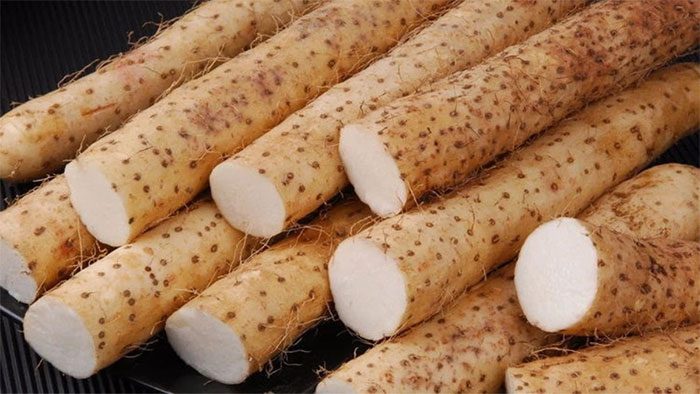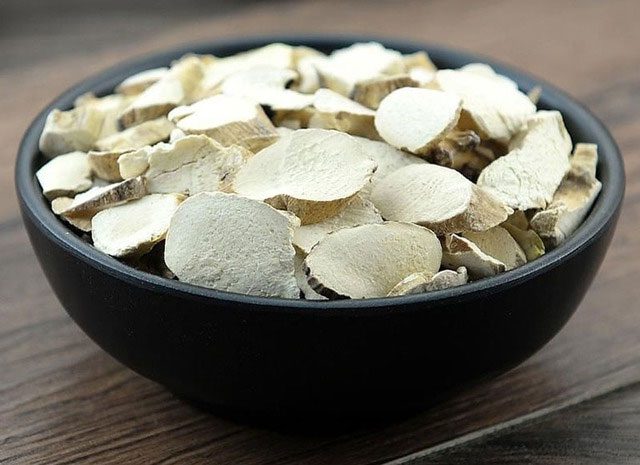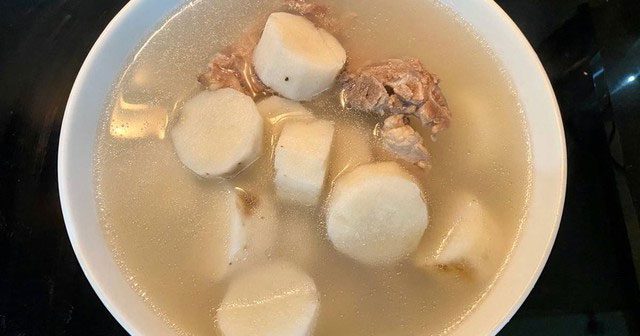This root is a popular medicinal herb in traditional medicine.
Notable Health Benefits of Chinese Yam
Chinese Yam, also known as Huai Shan, is a climbing herb with smooth, slightly angular stems that are pink in color, commonly found in the forests of northern mountainous provinces in Vietnam. The part used for medicinal purposes is the tuber, which has a gray-brown exterior and white powdery interior. After harvesting, the Chinese Yam is washed, peeled, and then dried or sun-dried for use in traditional medicine.
Modern medicine reveals that Chinese Yam contains 63.25% starch, 0.45% lipids, 6.75% protein, and 2-2.8% mucilage. Additionally, this root also contains other components such as dioscin, allantoin, saponins with steroidal structures, choline, and a variety of amino acids, oxidative enzymes, vitamin C, and many trace elements beneficial for health.
1. Blood Sugar Control
According to ancient texts, Chinese Yam has a sweet taste and neutral properties, beneficial for the spleen and kidneys, generating fluids and relieving thirst, calming the mind, and consolidating essence. It is commonly used to treat diabetes, chronic cough due to lung weakness, nocturnal emissions, leucorrhea, and frequent urination. A study from Japan indicated that this herb is used to treat diabetes in patients who are not responding to insulin therapy.

Chinese Yam has a sweet taste and neutral properties, beneficial for the spleen and kidneys…
Some studies also suggest that this root helps increase the production of GLP-1 hormone, prompting the pancreas to produce insulin, improving and restoring the function of pancreatic beta cells. Diabetic patients consuming Chinese Yam experience reduced hydrolysis of starch into sugar and decreased carbohydrate cravings, thus better controlling blood sugar levels after meals and preventing sudden spikes in blood sugar. Consequently, it also helps minimize the risk of diabetes-related complications effectively.
2. Kidney Support
Chinese Yam is also regarded as a food and medicinal herb that provides energy for the kidneys and supports kidney health. In traditional Chinese medicine, this herb has a sweet taste and neutral properties that benefit the spleen, stomach, lungs, and kidneys. It helps tonify kidney qi, nourish the spleen, stomach, and lungs, clear heat, and is used to “nourish the kidneys and treat conditions such as weak kidney yang, sexual dysfunction, cloudy urine, and weak spleen and stomach.”
3. Digestive Health
Incorporating Chinese Yam into your diet is a simple and effective way to protect your digestive system. Research shows that Chinese Yam inhibits pro-inflammatory cytokines and suppresses COX-2, protecting the expression of Carbonic anhydrase in the duodenum. Carbonic anhydrase is an enzyme that catalyzes the reaction producing bicarbonate in the pancreas, helping to neutralize gastric acid. Thus, Chinese Yam often appears in traditional Chinese medicine formulations to treat gastritis and acid reflux.

Dried Chinese Yam.
Additionally, the saponin (dioscin) in Chinese Yam helps reduce tissue damage by activating antioxidant enzymes. Another study indicated that diosgenin found in Chinese Yam significantly increases beneficial gut bacteria and aids digestion, including Lactobacillus murinus and Lactobacillus reuteri.
4. Antioxidant Properties
Chinese Yam is rich in manganese, a mineral that supports carbohydrate metabolism and energy production while providing antioxidant protection. Moreover, this root is also abundant in vitamin C and other antioxidants, helping to eliminate free radicals that can damage DNA and lead to heart disease and cancer.
5. Blood Pressure Reduction and Heart Disease Risk Mitigation
Chinese Yam contains high levels of vitamin B6, which helps break down homocysteine—an amino acid that can damage blood vessel walls, leading to heart attacks. Therefore, consuming Chinese Yam is effective in reducing the risk of developing heart diseases.

Research also shows that Chinese Yam has a high potassium content, which helps control blood pressure and heart rate by counteracting the hypertensive effects of sodium. Additionally, dioscorin found in Chinese Yam also helps inhibit angiotensin, increasing blood flow to the kidneys and effectively lowering blood pressure.
6. Skin Health
Adding Chinese Yam to your diet can also enhance skin beauty. Chinese Yam contains nutrients and beta-carotene, providing antioxidant properties. These compounds help eliminate harmful free radicals and prevent skin cell damage, thereby reducing dark spots and wrinkles. Furthermore, the vitamin C in Chinese Yam aids in regenerating damaged skin, promoting collagen production and helping the skin remain smooth and elastic.



















































